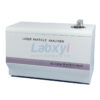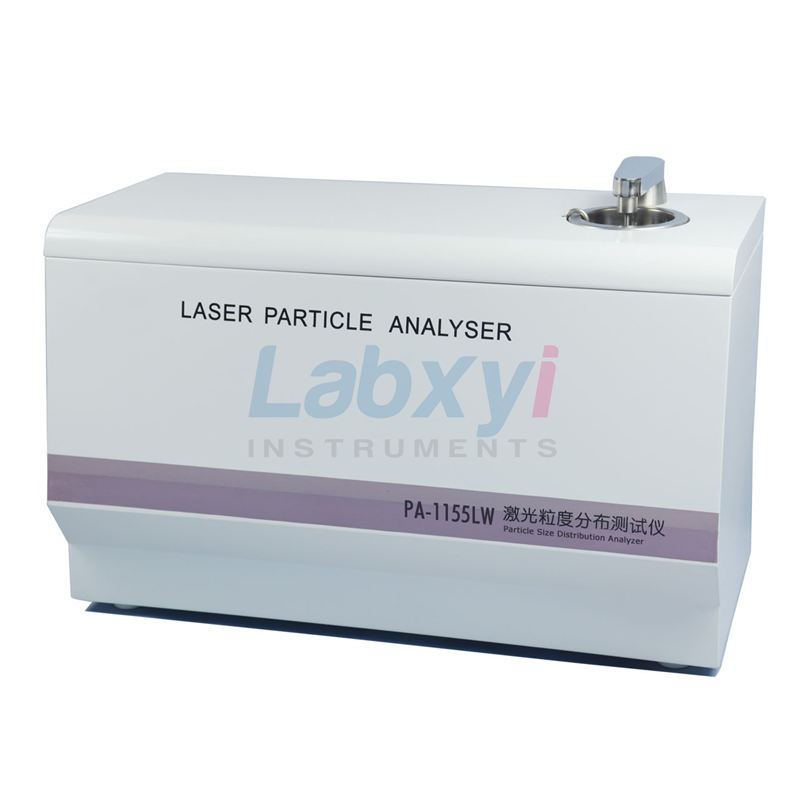Product advantages
- PA-1155 laser particle size analyzer is an economical and practical fully automatic laser particle size distribution analyzer. It calculates particle size distribution based on GB/T19077-2016, ISO13320 and other standards, Mie scattering and diffraction principles, and adopts the (unconstrained) free distribution mode of LabGenito ensure that each level of particle size reaches the highest resolution. The detector and optical system are independently designed by LabGeni, and the whole set of hardware and software have independent intellectual property rights.
- The fully sealed metal shell has good electromagnetic shielding and anti-interference performance. The optical components and circulation system are set inside the instrument, so that the sample flows in the pipeline for a short time, avoiding stratification and re-agglomeration after the sample is dispersed. The test time is about 1 minute, and it can be tested once or multiple times, with high data repeatability and good stability. The instrument is particularly suitable for production enterprises and application enterprises with a single product type and a narrow distribution of powder particle size.
Test Principle
Laser particle size analyzer is based on the principle of laser scattering, through laser , Fourier lens, photoelectric receiver, sample dispersion cycle, software data analysis and processing system to detect particle size distribution. Mie scattering theory shows that when the light beam is blocked by particles, A part of the light will be scattered, and the propagation direction of the scattered light will form an angle θ with the propagation direction of the main beam. Theta angle The size is related to the size of the particle. The larger the particle, the smaller the θ angle of the scattered light (Figure 1); The smaller the particles, the more The scattered light θ The larger the angle (Fig. 2).
That is, the scattered light at a small angle (θ) is caused by large particles, and the scattered light at a large angle (θ1) is caused by small particles. Further research shows that the intensity of scattered light represents the number of particles of that size. In this way, the intensity of scattered light at different angles is measured. The particle size distribution of the sample can be obtained.
Product Parameters
| Model | PA-1155LW |
| Measuring range | 0.1µm~200µm |
| Software Testing Program | Standard/fine powder/ultrafine powder program |
| Test Principle | Diffraction and scattering theory |
| Repeatability/Accuracy Error | Better than ±1 % ( national standard material D50 deviation) |
| Optical system | Inverted Fourier Optical System |
| Signal light source | Imported semiconductor laser, wavelength 650nm30mw |
| Multi-element detector | 52 class |
| Injection method | Wet injection, built-in wet circulation and dispersed injection system |
| Sample testing pool | 60mm×60mm high quality quartz glass |
| Circulation system flow | 1000ml/min, speed continuously adjustable |
| Sample dispersion pool | Volume 500mL, 304 All stainless steel |
| Distributed | built-in 60w Ultrasonic Disperser |
| Test medium | Tap water, distilled water or ethanol can also be used according to the characteristics of the powder |
| Fully automatic testing | Automatic water absorption, centering, measurement, cleaning and drainage |
| Single test time | 1-2 minute |
| Sample quantity | Milligrams to grams per time (related to the specific gravity, particle size, and refractive index of the sample) |
| Testing software | Modular software design, visualized instrument status, and user-friendly operation interface |
| Data Output | Particle size distribution table, particle size distribution curve, etc. |
| Software operating environment | Win XP/Win7/Win10 |
| Interface | use RS232 and USB Standard serial data transmission |
| Dimensions/weight | long 740×Width 365×High 505 (mm ), approx. 60kg |
| Working power supply | AC220V ±22V 50Hz ±0.5Hz Power: 200W |





